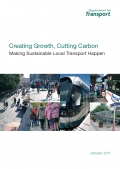Uploaded by Clare Degenhardt 5458 days ago Number of pages: 34 File's language: English Views: 798
This White Paper sets out the Government's proposal to introduce a power for local
authorities and the Greater London Authority (GLA) to raise and retain local supplements
on the national business rate, having examined carefully the potential benefits and costs,
including economic impacts.
Building on the extensive public debate on reforms to business rates in England, the
recommendations of the Lyons Inquiry and the commitment to consider options for
business rate supplements in the review of sub-national economic development and
regeneration, the Government’s proposed model for business rate supplements involves
four levels of protection for business:
• Revenue from supplements will only be available for spending on
economic development – such as infrastructure. Plans will need to be
clearly specified and committed in advance. Spending will be subject to a
transparent accounting framework to ensure this.
• A national upper limit of 2p in the pound will be set on the level of
supplements that can be levied.
• To protect smaller businesses from disproportionate burdens, properties liable
for business rates with a rateable value of £50,000 or less will be
exempted from paying supplements.
• Where the supplement will support more than a third of the total cost
of the project there will additionally be a full ‘double-lock’ ballot of
businesses affected.
Revenues from supplements will be locally raised and retained, with local
decision-making on the duration of any supplement and the specific projects it should be
spent on. The Government intends that that only the highest tier local authority in
any area should be entitled to levy supplements. These authorities will be able to
cooperate to raise supplements to fund joint projects, within the existing statutory
framework. In London, the power will rest with the Greater London Authority. Shire
counties will be required to consult their districts on any new supplement proposals.
The Government will consult on technical issues before finalising detailed
arrangements.
 Skills for growth: the national skills strategy
Skills for growth: the national skills strategy Putting the Frontline FIrst; Smarter Government
Putting the Frontline FIrst; Smarter Government Bronchiolitis Obliterans and Food Flavouring Agents
Bronchiolitis Obliterans and Food Flavouring Agents Bronchiolitis Obliterans and Food Flavouring Agents
Bronchiolitis Obliterans and Food Flavouring Agents Towards a Sustainable Transport System Supporting Economic Growth in a Low Carbon World
Towards a Sustainable Transport System Supporting Economic Growth in a Low Carbon World Novel Materials in the Environment: The case of nanotechnology
Novel Materials in the Environment: The case of nanotechnology The National Security Strategy of the United Kingdom Security in an interdependent world
The National Security Strategy of the United Kingdom Security in an interdependent world The National Security Strategy of the United Kingdom Security in an interdependent world
The National Security Strategy of the United Kingdom Security in an interdependent world Unleashing Aspiration: The Government Response to the Final Report of the Panel on Fair Access to the Professions.
Unleashing Aspiration: The Government Response to the Final Report of the Panel on Fair Access to the Professions. Business Rate Supplements: a White Paper
Business Rate Supplements: a White Paper Meeting the Energy Challenge: A White Paper on Energy
Meeting the Energy Challenge: A White Paper on Energy Cutting Carbon, creating growth: making sustainable local transport happen - White Paper
Cutting Carbon, creating growth: making sustainable local transport happen - White Paper The digital switchover help scheme: a scheme agreement between Her Majesty's Secretary of State for Culture, Media and Sport and the British Broadcasting Corporation revised agreement
The digital switchover help scheme: a scheme agreement between Her Majesty's Secretary of State for Culture, Media and Sport and the British Broadcasting Corporation revised agreement An Invitation to Shape the Nature of England - Discussion Document for the White Paper
An Invitation to Shape the Nature of England - Discussion Document for the White Paper
iKNOW has been featured in the media and several research projects:
DIE ZEIT (Germany), Financial Times (Germany), El Heraldo (Colombia), Prospective Foresight Network (France), Nationalencyklopedin (Sweden), EFP - European Foresight Platform (EC), EULAKS - European Union & Latin America Knowledge Society (EC), CfWI - Centre for Workforce Intellience (UK), INFU - Innovation Futures (EC), Towards A Future Internet (EC), dstl - Defence S&T Laboratory (UK), EFSA - European Food Safety Agency (EU), Malaysia Foresight Programme (Malaysia), Bulletins Electroniques more...
